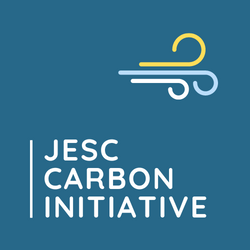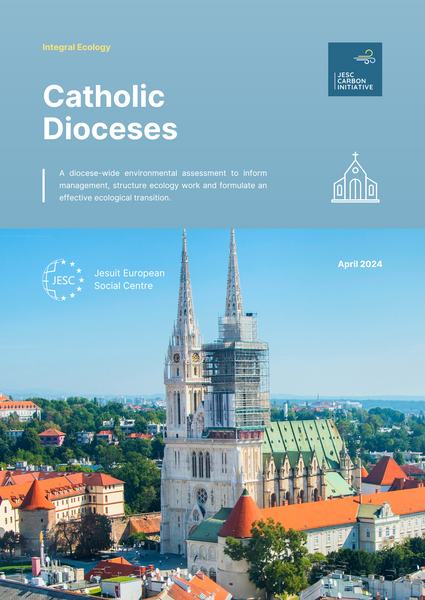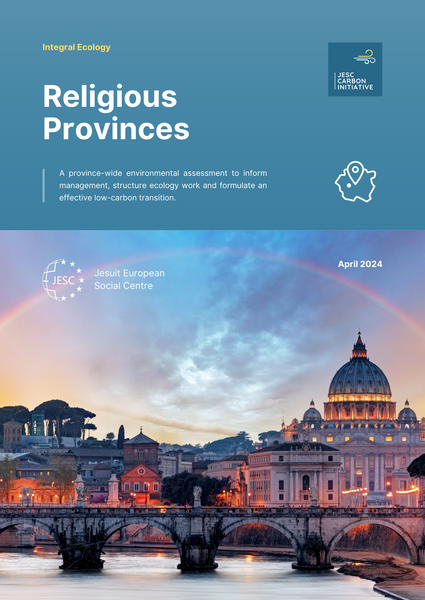
Together in the ecological transition
The climate crisis is bringing severe consequences to nature and the people of this planet, in particular, to the most vulnerable. Answering this urgent call for reducing our environmental footprint involves us all: governments, institutions, communities and ultimately each of us as individuals. Every step counts, and we can all make a difference.
The JESC Carbon Initiative is a project by the Jesuit European Social Centre which uses carbon emissions assessments to assist faith actors in contributing to this collective effort and becoming more sustainable: from individual lifestyles and community life to the operations of institutions, schools and congregations.
“Working with JESC has enabled us to estimate and analyse the EOF Province’s carbon footprint, giving us the benchmarks we needed to take a consistent approach to reducing our emissions”
Gabrielle Pollet
Ecological Transition Officer, Jesuit EOF Province
What do we do?
The JESC Carbon Initiative aims to foster sustainable practises and assist the ecological conversion of institutions and communities by making the science behind climate action accessible. Unveiling and relating to the environmental impact of our actions is the best way to raise awareness and design a collectively-owned, impactful, climate transition plan.
Carbon auditing and eco-diagnosis
A science-based approach to climate action and reflection is crucial to develop and nurture ecological counsciousness. For this purpose, we have developed custom environmental assessment tools through which we can evaluate the carbon footprint and the resource intensity of personal lifestyles and the operations of different types of institutions.
Participation and eco-formation
Our diagnostic process is designed around the idea that climate action is most effective when collectively-owned and embraced. Because of this, we follow an bottom-up approach through which every staff member or community member can take part, get a first-hand experience on the topic of environmental auditing and also deliver their input into the formulation of a climate strategy.
Nurturing a community of practice
The JESC Carbon Initiative works towards developing a network of environmentally counscious faith-inspired actors with an active interest around the topic of decarbonisation and sustainability management. This platfom will be used to share materials and experiences and serve to ensure that the project remains aligned with the needs and the level of ambition of its members.
The project today
Launched in 2022, the JESC Carbon Initiative works along environmentally counscious institutions and communities assisting in evaluating their ecological profile, raising climate awareness and in bringing forward science-based action around the themes of decarbonisation and economic circularity.
2.527
People have taken part in the
project across all partnerships
44
Reports
produced
257
Recommendations
delivered
Today, the project supports and accompanies individual and group environmental efforts helping to determine best practices and providing guidance on reducing the environmental footprint of lifestyles and the operations of different types of institutions.
The current project focus encompasses the ecological assessment of religious communities and institutions, the operations of NGOs, schools, as well as events and conferences.
Communities
Institutions
Schools
Events
Dioceses
Provinces
Lifestyles
Operations
Operations
Operations
Operations
Operations
Group assessment available
Our lines of work
In order to accompany and assist ecological transition processes, our project has a number of pre-established frames for analysis - the eco-evaluation of communities, institutions, schools, events, dioceses and provinces.
Below you can find a more in-depth insight into these lines of work, what they entail, and through the tackling of which areas we aim to align each particular reality with environmental sustainability.
Sustainable communities
We work closely with communities to evaluate the environmental impact of lifestyle choices and design practical roadmaps towards more integral and climate-friendly ways to live and to relate to our planet.
Taking part in the assessment process and receiving their results allows communities to develop and nurture an informed discussion on the topic of the care for the environment and climate action.

Scope of analysis
Communities
Building
Energy
Water
Mobility
Electronics
Other purchases
Waste
Diet
Eco-governance
Values
Participation
Community members
Outcomes
Community report
Executive report
Individual reports
Group assessment
Sustainable institutions
We work with eco-conscious institutions who want to explore the theme of climate action and develop informed approaches to sustainability in the context of their offices and their operations.
The assessment process involves both management and staff members, and scans through the different areas of the organisation to draft scenarios aimed at reducing the environmental impact of the activity of an institution.

Scope of analysis
Institutions
Facilities
Energy
Water
Business travel
Equipment
Expenses
Waste
Office diet
Events
Communications
Projects
Eco-governance
Values
Participation
Management team
Staff
Outcomes
Institution report
Executive report
Group assessment
Assessment Guide (English)
Sustainable schools
Schools have a central role to play in the ecological transition, both as important economic actors in society as well as educators of future generations.
We work with schools to design participative ecological assessments with the aim of enhancing the sustainability of their operations, drafting decarbonisation scenarios and improving literacy around sustainability and carbon management through a shared practical experience.

Scope of analysis
Schools
Facilities
Energy
Water
Commuting
Equipment
Expenses
Waste
Food at school
School trips
Eco-education
Eco-initiatives
Eco-governance
Values
Participation
Management team
Teachers and other staff
Students
Guardians
Outcomes
School report
Executive report
School carbon guide
Group assessment
Sustainable events
The environmental assessment of events allows for a practical, tangible, way to introduce participants to the theme of climate action, carbon management, and existing challenges to decarbonising the economy.
We work with eco-conscious partners to assess the environmental profile of events across different areas and indicators and provide an insight into more sustainable approaches to designing events.

Scope of analysis
Events
Event venue
Accommodation
Use of spaces
Digital
Expenses
Travel
Preparations
Menu
Values
Participation
Event organisers
Event attendees
Outcomes
Event report
Executive report
Assessment Guide (English)
Catholic dioceses
Dioceses can play a pivotal role in the ecological transition by championing the sustainable management of building stocks and serving as moral and community leaders.
We work with dioceses to assess the environmental profile of their activity, embed the ecological variable within their processes and design diocesan strategies so they can become more sustainable.

Project presentation
Learn about how this project can help guide your diocese’s ecological transition by downloading the project guide.
In it you will find the timeline of the project, how it can be adapted to your diocese, its requirements and its expected outcomes.

Scope of analysis
Dioceses
Buildings
Energy
Water
Mobility
Equipment
Waste
Eco-governance
Values
Participation
Management team
Diocesan network
Outcomes
Diocesan report
Executive report
Religious provinces
By aligning their institutions, education, and diverse web of human networks with sustainability, religious provinces are ideally positioned to be impactful and inspire others.
We work with provinces to evaluate the greenhouse gas emissions derived from their activity, foster an internal conversation on the topic of ecology and design tailored ecological transition roadmaps.

Project presentation
Learn about how this project can help guide your province’s ecological transition by downloading the project guide.
In it you will find the timeline of the project, how it can be adapted to your province, its requirements and its expected outcomes.

Scope of analysis
Provinces
Buildings
Energy
Water
Mobility
Equipment
Waste
Eco-governance
Values
Participation
Management team
Provincial community
Outcomes
Provincial report
Executive report
Want to know more?
Do you have any question about the project? Is your organisation or community interested in learning about or exploring the next steps towards designing and managing its own ecological transition?
Contact us to learn more about how a partnership with the JESC Carbon Initiative can help you in your journey towards sustainability and ecological conversion.

